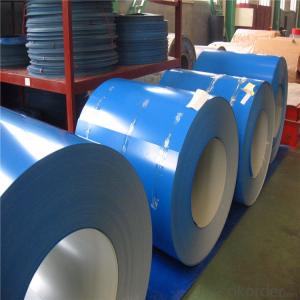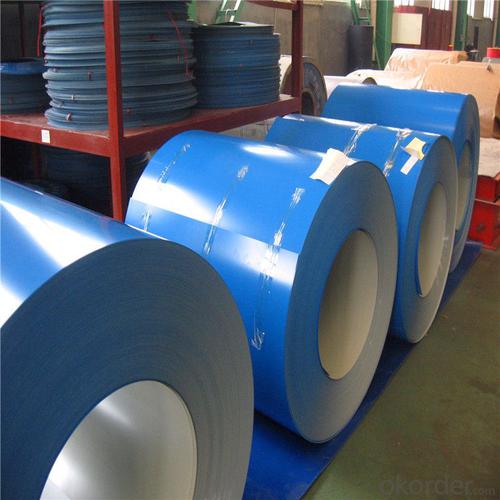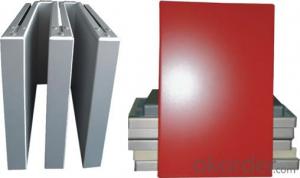JIS3312 Prepainted Wood Grain PPGL for PU Panel
- Loading Port:
- Tianjin
- Payment Terms:
- TT OR LC
- Min Order Qty:
- 100 m.t.
- Supply Capability:
- 500000 m.t./month
OKorder Service Pledge
OKorder Financial Service
You Might Also Like
Specification
JIS3312 Prepainted Wood Grain PPGL for PU Panel
Description of JIS3312 Prepainted Wood Grain PPGL for PU Panel
Product | PPGI/PPGL |
Capacity | 5,000 tons/month |
Base material | Hot dipped galvanized steel |
Thickness | 0.2-2.0mm |
Width | 600-1250mm(according to your need) |
Coil Weight | 3-6tons |
Quality | SGCC, DX51D |
Color | RAL No. or customers samples’ color |
Zinc-coating | 30g/m2-180g/m2 |
Coil ID | 508mm/610mm |
Technique | Cold rolled—hot dipped galvanized—color coated |
Painting | Top painting:15~25μm |
Back painting: 6~10μm | |
Tolerance | Thickness: +/-0.02mm |
Width:+/-2mm | |
Shipment time | within 15-45 workdays |
Payment | T/T, L/C at sight |
Packing | Standard export packing |
The special order can be negotiated. | |
Application of JIS3312 Prepainted Wood Grain PPGL for PU Panel
APPLICATION OF OUR PREPAINTED STEEL | ||||||||||
Construction | Outside | Workshop,agricultural warehouse,residential precast unit | ||||||||
corrugated roof,roller shutter door,rainwater drainage pipe,retailer booth | ||||||||||
Inside | Door,doorcase,light steel roof stucture,folding screen,elevator,stairway,ven gutter,Construction Wall | |||||||||
Electrical applicance | Refrigerator,washer,switch cabnet,instrument cabinet,air conditioning,micro-wave owen,bread maker | |||||||||
Fuiniture | Central heating slice,lampshade,chifforobe,desk,bed,locker,bookself | |||||||||
Carrying trade | Exterior decoration of auto and train,clapboard,container,isolation lairage,isolation board | |||||||||
Qthers | Writing panel,garbagecan,billboard,timekeeper,typewriter,instrument panel,weight sensor,photographic equipment | |||||||||
Products Show of JIS3312 Prepainted Wood Grain PPGL for PU Panel

Product Advantages
1.With nearly 20 years experience in prepainted steel, accommodate different marketdemands. | ||||||||||||||
2.'Quality first, service first' is our business aim; 'The good faith get respect,cast quality market' is our Business philosophy . | ||||||||||||||
3.Having two series producttion line,with the abbual production capacity of 240000 tons. | ||||||||||||||
4.Exceed International ISO9001:2008&ISO14001:2004 quality and environmental standards | ||||||||||||||
5.Meet with ROHS standard |
Company Information
CNBM International Corporation is the most important trading platform of CNBM group.
Whith its advantages, CNBM International are mainly concentrate on Cement, Glass, Iron and Steel, Ceramics industries and devotes herself for supplying high qulity series of refractories as well as technical consultancies and logistics solutions.


F A Q
1, Your advantages?
professional products inquiry, products knowledge train (for agents), smooth goods delivery, excellent customer solution proposale
2, Test & Certificate?
SGS test is available, customer inspection before shipping is welcome, third party inspection is no problem
3, Factory or Trading Company?
CNBM is a trading company but we have so many protocol factories and CNBM works as a trading department of these factories. Also CNBM is the holding company of many factories.
4, Payment Terms?
30% TT as deposit and 70% before delivery.
Irrevocable L/C at sight.
5, Trading Terms?
EXW, FOB, CIF, FFR, CNF
6, After-sale Service?
CNBM provides the services and support you need for every step of our cooperation. We're the business partner you can trust.
For any problem, please kindly contact us at any your convenient time.
We'll reply you in our first priority within 24 hours.
- Q: How is special steel used in the production of consumer goods?
- Special steel is used in the production of consumer goods due to its exceptional strength, durability, and corrosion resistance. It is commonly employed in the manufacturing of kitchen appliances, cutlery, automotive parts, and electronics, ensuring high-quality and long-lasting products for consumers.
- Q: How does special steel perform in terms of corrosion resistance in acidic environments?
- Special steel, such as stainless steel, exhibits excellent corrosion resistance in acidic environments due to its high chromium content. The chromium forms a protective oxide layer on the surface of the steel, preventing the corrosive attack of acids. This makes special steel a reliable choice for applications where exposure to acidic environments is a concern.
- Q: What are the different automotive grades of special steel?
- There are several different automotive grades of special steel used in the automotive industry. These grades are specifically designed to meet the unique requirements and demands of the automotive sector. Some of the commonly used grades include: 1. Advanced High-Strength Steels (AHSS): These grades of steel are known for their exceptional strength and excellent formability. AHSS is used in critical automotive components like chassis, body panels, and safety systems to enhance crash performance while reducing weight. 2. Dual-Phase Steels (DP): DP steels are a type of AHSS that offer a combination of high strength and good ductility. They are commonly used in automotive applications that require both strength and formability, such as structural components and reinforcements. 3. Martensitic Steels: These steels are known for their high strength and hardness. They are often used in automotive applications that require resistance to wear and impact, such as crankshafts, gears, and axles. 4. Transformation-Induced Plasticity (TRIP) Steels: TRIP steels are designed to provide high strength, good formability, and excellent energy absorption during impact. They are utilized in automotive safety components like bumper reinforcements and crash boxes. 5. High-Strength Low-Alloy (HSLA) Steels: HSLA steels offer a balance between strength, formability, and cost-effectiveness. They are commonly used in automotive structural components and suspension systems to reduce weight while maintaining structural integrity. 6. Stainless Steels: Stainless steels are corrosion-resistant and are used in automotive applications that require resistance to rust and corrosion, such as exhaust systems, fuel tanks, and decorative trims. These different grades of special steel provide automotive manufacturers with a wide range of options to meet specific needs in terms of strength, formability, durability, and corrosion resistance. The selection of the appropriate grade depends on the intended application and the desired performance characteristics.
- Q: What are the specific requirements for special steel used in the textile machinery industry?
- The specific requirements for special steel used in the textile machinery industry include high strength and durability to withstand the high-speed operations and repetitive movements of the machinery. The steel should also possess excellent wear resistance to prevent premature wear and tear. Additionally, it should have good corrosion resistance to withstand exposure to moisture and chemicals commonly found in textile processing. Lastly, the steel should exhibit good heat resistance to maintain its structural integrity even under high temperatures generated during the production process.
- Q: What are the different high-temperature grades of special steel?
- There are several different high-temperature grades of special steel that are designed to withstand extreme heat and provide enhanced mechanical properties. Some of the most commonly used high-temperature grades include: 1. Stainless steel 310: This grade is known for its excellent resistance to oxidation at high temperatures. It has a high chromium and nickel content, which provides good corrosion resistance and high strength at elevated temperatures. 2. Inconel 625: Inconel alloys are nickel-based superalloys that are highly resistant to oxidation and corrosion. Inconel 625, in particular, offers excellent strength and toughness at high temperatures, making it suitable for applications in the aerospace and chemical processing industries. 3. Hastelloy X: Hastelloy X is a nickel-chromium-iron-molybdenum alloy that exhibits exceptional strength and oxidation resistance at high temperatures. It is commonly used in gas turbine engines, industrial furnace components, and other high-temperature applications. 4. Alloy 800H: This grade of special steel is an austenitic alloy with high resistance to oxidation, carburization, and nitridation. It is often used in heat exchangers, furnace components, and petrochemical applications. 5. Titanium Grade 5: Although not technically a steel, titanium grade 5 is a high-temperature alloy that offers outstanding strength and corrosion resistance at elevated temperatures. It is commonly used in aircraft engine components, chemical processing equipment, and marine applications. These are just a few examples of the high-temperature grades of special steel available in the market. Each grade is specifically designed to excel in different applications where extreme heat resistance and mechanical properties are required.
- Q: What are the challenges in forming special steel?
- Forming special steel poses several challenges due to its unique characteristics and properties. Some of the main challenges include: 1. High melting point: Special steels often have high melting points, which require specialized equipment and processes to heat and form the material. This can lead to increased energy consumption and cost. 2. Alloy composition: Special steels are typically alloyed with various elements to enhance their properties, such as strength, hardness, and corrosion resistance. However, the precise control of alloy composition can be challenging, as minor variations can significantly affect the material's properties. 3. High carbon content: Certain special steels, such as tool steels, contain high carbon content to enhance hardness and wear resistance. However, this high carbon content makes the material more prone to cracking during forming processes like forging or rolling. Special care must be taken to prevent these cracks and ensure the desired shape is achieved. 4. Heat treatment requirements: Special steels often require specific heat treatment processes, such as quenching and tempering, to achieve the desired mechanical properties. These processes can be complex and require precise control of temperature, time, and cooling rates. Failure to properly carry out heat treatment can result in poor material performance or even structural failure. 5. Surface finish and dimensional accuracy: Special steels are often used in applications where surface finish and dimensional accuracy are critical, such as in the aerospace or automotive industry. Achieving the required surface finish and dimensional accuracy during forming operations can be challenging, requiring advanced tooling and precision machining techniques. 6. Specialized equipment and expertise: Special steels may require specialized equipment and expertise to form, such as high-pressure hydraulic presses, induction heating equipment, or vacuum furnaces. These specialized tools and processes add complexities and costs to the manufacturing process. Despite these challenges, forming special steels is essential in various industries where their unique properties are required. Manufacturers continuously invest in research and development to overcome these challenges and improve the forming processes of special steels.
- Q: How does special steel contribute to the defense and security industry?
- Special steel plays a crucial role in the defense and security industry by offering enhanced strength, durability, and resistance to extreme conditions. This type of steel is specifically designed to meet the unique demands of the industry, ensuring that military equipment and infrastructure can withstand the most challenging environments and threats. One significant contribution of special steel to the defense and security sector is in the manufacturing of armored vehicles and tanks. These vehicles require high-strength steel to protect military personnel from ballistic and explosive threats. Special steel provides the necessary toughness and resilience to withstand impacts, ensuring the safety of soldiers on the battlefield. Furthermore, special steel is also instrumental in the production of naval vessels and submarines. The maritime environment is highly corrosive, with saltwater and harsh weather conditions posing significant challenges. By utilizing special steel, naval ships can be constructed with superior corrosion resistance, extending their lifespan and reducing maintenance costs. In addition to its applications in vehicle and vessel manufacturing, special steel is vital for the production of military-grade weaponry and ammunition. The high strength and durability of this steel ensure that firearms, missiles, and other weapons can withstand extreme forces and function reliably in critical situations. This reliability is of utmost importance in the defense and security industry, where the failure of weapons could have severe consequences. Moreover, special steel also contributes to the construction of critical infrastructure for defense purposes. This includes structures such as military bases, bunkers, and communication towers. Special steel's ability to withstand extreme temperatures, high pressures, and other challenging conditions ensures the reliability and longevity of these structures, enhancing national security. In summary, special steel's unique properties, including high strength, durability, and resistance to extreme conditions, make it an essential component in the defense and security industry. By incorporating this material into military equipment, vehicles, weaponry, and infrastructure, defense organizations can ensure the safety, reliability, and effectiveness of their operations, ultimately contributing to national security.
- Q: How does special steel perform at high temperatures?
- Special steel performs well at high temperatures due to its unique composition and properties. It exhibits excellent strength, corrosion resistance, and thermal stability, enabling it to retain its mechanical properties even at elevated temperatures. Additionally, special steel has low thermal expansion, ensuring dimensional stability even under extreme heat. These characteristics make it ideal for applications in industries such as aerospace, oil and gas, and power generation, where high temperatures are commonplace.
- Q: How does special steel compare to stainless steel?
- Special steel and stainless steel are two distinct types of steel with different properties and applications. While stainless steel is known for its corrosion resistance, special steel is recognized for its exceptional strength and durability. Special steel is often used in high-stress environments where resistance to wear, impact, or extreme temperatures is crucial. On the other hand, stainless steel is preferred in applications where resistance to rust and staining is essential, such as in kitchen appliances or medical instruments. Therefore, the choice between special steel and stainless steel depends on the specific requirements and desired characteristics for a particular application.
- Q: What are the different surface finishing techniques for special steel?
- Some of the different surface finishing techniques for special steel include electroplating, powder coating, passivation, etching, and polishing.
Send your message to us
JIS3312 Prepainted Wood Grain PPGL for PU Panel
- Loading Port:
- Tianjin
- Payment Terms:
- TT OR LC
- Min Order Qty:
- 100 m.t.
- Supply Capability:
- 500000 m.t./month
OKorder Service Pledge
OKorder Financial Service
Similar products
Hot products
Hot Searches
Related keywords





























